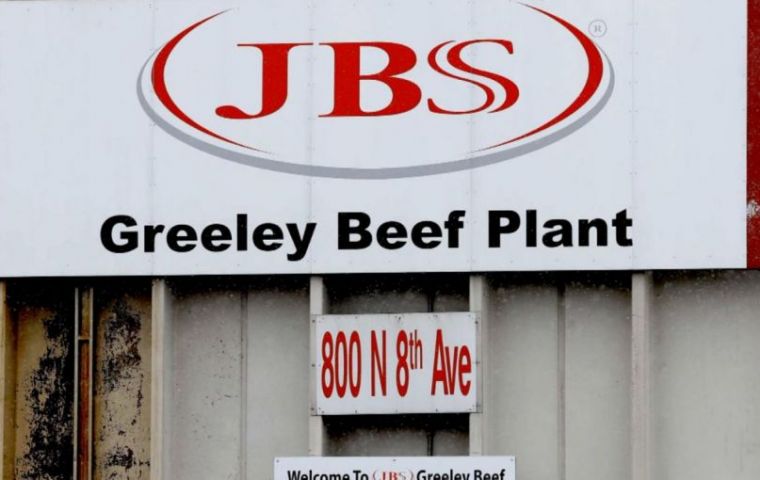MercoPress. South Atlantic News Agency
JBS US branch attacked by hackers paralyzing meat processing in US, Canada and Australia
 With everything from knife sharpening to production line speed controls relying on automation, the cyber attack forced JBS to halt operations across the globe
With everything from knife sharpening to production line speed controls relying on automation, the cyber attack forced JBS to halt operations across the globe United States branch of Brazilian giant meat processor started to return to a plant in Texas, but with new instructions, get ready to do things a bit differently than normal: work by hand.
With everything from knife sharpening to production line speed controls relying on automation, coming back from a cyber attack that forced the world's largest meat producer to halt operations across the globe, will be complicated.
“There's a lot of automation, there's a lot of reliance on technology,” said Wendell Young, head of the United Food and Commercial Workers' (UFCW) local union representing 1,500 members at JBS' beef slaughterhouse in Souderton, Pennsylvania. “You can disconnect some of those wires and switches and run things old-school, but before you do, you want to make sure that everything's running smoothly.”
Sunday's cyber attack, apparently from Russian hackers, forced the Brazilian food giant to shut down all of its beef plants in the United States - accounting for almost a quarter of American supplies - and slow pork and poultry production. Slaughtering operations across Australia were halted and at least one Canadian plant was idled.
JBS, which has facilities in 20 countries, also owns Pilgrim's Pride, the second-biggest US chicken producer. The extent of the outages may never be known as JBS did not detail the impact.
The company said late on Tuesday that it had made “significant progress” to resolve the attack and would have the “vast majority” of its plants operational by Wednesday.
“Our systems are coming back online and we are not sparing any resources to fight this threat,” JBS USA chief executive Andre Nogueira said in a statement.
At least some plants were planning to operate manually, meaning logistical labor like packaging and accounting for cattle would be a challenge, according to workers.
There is likely to be “some more manual processes than normal in the early days, until they're sure everything's back up and running properly”, Mr. Young said.
The attack on JBS and ensuing shutdowns upended agricultural markets and raised concerns about food security as hackers increasingly target critical infrastructure. United States has no Department of Agriculture cyber-security regulations or requirements for meat packers, a US official said.
In Texas returning workers also had to deal with issues like cattle left in freezers longer than usual, potentially rendering them inedible. Employees also are seeking full confirmation that their personal data housed by JBS was not compromised. The company has said that it is not aware of any evidence that customer, supplier or worker data has been leaked.
At plants in Nebraska, some employees returned on Wednesday and Thursday , according to Eric Reeder, president of UFCW Local 293 in Omaha. He was not yet sure if operations will be at full production.
“Everything is run by the computers,” Reeder said. “If they can't access them, they can't run.”
This Thursday, an Omaha plant resumed work while one in Pennsylvania was back to normal status, labor union leaders said. JBS said its Canadian beef facility in Alberta, one of the largest in the country, has resumed production. Workers at the Longford beef processing plant in Australia have been told operations will resume on Friday, according to a spokesman for the Australasian Meat Industry Employees Union in Tasmania.
JBS is a Brazilian corporation and the world's largest processed meat supplier with operations in the United States, Australia, Canada, Europe, Mexico, New Zealand, Britain and several South American countries.




Top Comments
Disclaimer & comment rulesCommenting for this story is now closed.
If you have a Facebook account, become a fan and comment on our Facebook Page!